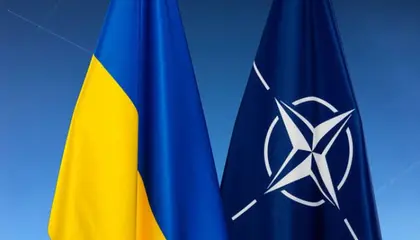It is not often that NATO country leaders gather for a summit amidst a large and continuing war in Europe. Such ideas conjure images of Churchill and Roosevelt on a battleship somewhere in the North Atlantic. Yet that is precisely the backdrop to the gathering of NATO leaders in Vilnius on July 11-12.
What NATO leaders say and do in response to Russia’s all-out war against Ukraine is the key issue — but not for the reason most people think, i.e., to offer Ukraine more protection. Instead, it is about securing the future of Europe in its entirety.
NATO’s number one job, indeed its only real job, is guaranteeing the security and defense of its current member states. NATO does this brilliantly in a variety of ways: permanently deploying Western forces in the Baltic States, conducting major exercises, adding strategic depth with Finnish and (hopefully) Swedish membership, and increasing defense spending to a minimum of 2 percent of GDP.
These are all good policies. But there is a problem. If Ukraine is not secure, Europe is not secure.
Russia’s current war has already forced almost six million Ukrainian refugees into neighboring European countries, caused massive inflation (in part because of energy disruptions), reduced global food supplies and Black Sea shipping, caused further economic dislocations because of sanctions policies and the need to support Ukraine’s state budget, and stretched European defense resources.

No Compromising With the Kremlin
This is damage enough. But if Putin is not defeated in Ukraine, it will get worse. In his quest to rebuild the Russian Empire, Putin would next turn his gaze to Estonia, Latvia, Lithuania, and even Finland – all EU and NATO member states which were formerly part of the Russian Empire and which NATO is obligated to protect.
Individual NATO allies have gone to extraordinary lengths to get Ukraine the training and equipment it needs to fend off Russia’s aggression. It is gradually working. The war is far from over, but it is clear that Putin will fail in his quest to eliminate Ukraine and its sense of national identity. Ukraine is now a permanent fixture of a democratic Europe.
But what of the future? The only thing that has successfully deterred Russian aggression in Europe is NATO. Where countries have been left out of NATO, Putin has felt free to undermine or attack. In Putin’s worldview, grey zones are green lights.
Once the guns fall silent, it will be in NATO’s own interest to make sure such a war never happens again. Yes, Ukraine will be strong — heavily armed and combat-hardened. But Russia will also regroup, rebuild, and prepare to attack again. A new war would impact every NATO nation all over again. The only sure way to protect Europe in the future will be to bring Ukraine, and others left in Europe’s grey zones (like Moldova) into the alliance.
The temptation facing alliance leaders in Vilnius will be to kick the can down the road yet again (remember the first promise of NATO membership for Ukraine was made 15 years ago.) They will want to avoid giving the impression that Russia’s war against Ukraine is turning into a NATO war against Russia.
Despite President Biden’s assertion in a CNN interview on July 9 that Ukraine is not ready for alliance membership, the truth is the opposite. Ukraine is more than ready; it is the US (and perhaps one other ally) who are not.
Merely repeating old formulas and the vague assurances of the past will not be sufficient to signal to Putin — and his successors — that NATO is determined to guarantee the security of Europe in the face of any future aggression.
NATO leaders must make it crystal clear to Putin that they are serious about the security of Europe. Not only that they will do whatever it takes to help Ukraine protect itself today, but also, they will welcome Ukraine into NATO as soon as it is practical to do so. And that they are doing this not just for Ukraine’s sake, but for their own.
Ambassador Kurt Volker is a Distinguished Fellow at the Center for European Policy Analysis. A leading expert in US foreign and national security policy, he served as US Special Representative for Ukraine Negotiations from 2017-2019, and as US Ambassador to NATO from 2008-2009.
Reprinted with the author’s permission. See the original as published by CEPA here.
The views expressed in this opinion article are the author’s and not necessarily those of Kyiv Post.
You can also highlight the text and press Ctrl + Enter






